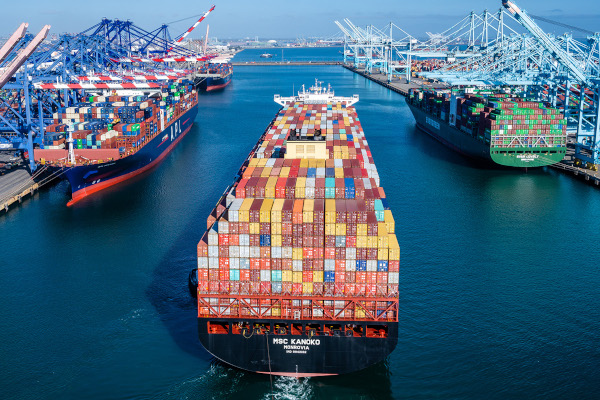Navigating the De Minimis Dilemma: Importers Face Uncertainty
Tariffs are making a comeback, and the consequences might be more significant than many anticipate.Craig Reed, who serves as the Senior Vice President of Global Trade at Avalara, points out that businesses are feeling lost and reactive in this shifting landscape. In this chat,he discusses the confusion surrounding global trade dynamics,misconceptions about the de minimis rule,and potential repercussions if China decides to retaliate.
Supply Chain 24/7: What’s on companies’ minds regarding recent tariff changes?
Craig Reed: The primary sentiment I’m hearing is one of uncertainty. Companies are bombarded with questions—everything from rules of origin they’ve never considered to how costs will shift and compliance can be maintained. The scale of disruption is massive; nearly every global player will need to rethink their strategies and supply chains significantly. Though, aside from Canada, mexico, and China, we still don’t have a complete picture of tariffs ahead. This ambiguity leads to hesitation in decision-making.
SC247: are firms viewing this as a temporary hiccup or making lasting changes?
CR: Right now, it truly seems like businesses are focused on immediate survival due to the unpredictability ahead. They’re trying to figure out how these tariffs will affect them specifically—this understanding may lead them to adopt short-term fixes like switching suppliers or raising prices for consumers.Once things stabilize and companies grasp long-term impacts better, they might consider more permanent adjustments such as nearshoring or altering product compositions so they aren’t reliant on certain countries anymore. It’s crucial to note that uncertainty hampers long-term planning; relationships built over years won’t dissolve overnight.
SC247: Which sectors are feeling these tariff shifts most acutely?
CR: Manufacturing is likely taking the hardest hit right now—think about industries like automotive or consumer electronics where supply chains can get incredibly intricate. Many manufacturers depend on numerous components sourced from places like china or Mexico; replacing those unique suppliers isn’t straightforward.
SC247: How are companies coping with what you call “tariff whiplash”?
CR: The lead-up to these new tariffs has left many businesses reeling daily with changing regulations—it feels chaotic! To adapt quickly enough amidst all this change, firms are reassessing their sourcing strategies while employing what we call “tariff engineering.” This means restructuring supply chains strategically so they minimize exposure risks related to affected countries.
Companies looking for an edge invest in tech solutions that track policy updates in real-time while identifying alternative suppliers who pose lower risks but offer high returns—a smart move for staying compliant amid chaos!
“Manufacturing is likely taking the hardest hit right now.”
— Callout Attribution
SC247: You mentioned some misunderstandings around the de minimis rule—what should companies know?
CR: A key point here is that under proposed changes regarding de minimis rules—the threshold won’t just apply based on where goods come from but also where they’re made! Historically used middleman tactics won’t work anymore since any item produced in China won’t qualify nonetheless of its shipping country.
Businesses need a thorough review of their sourcing strategies now more than ever—to diversify supplier bases effectively before new policies disrupt operations further down the line.
SC247: What broader implications could arise from U.S.-China trade tensions?
CR: Given both nations’ economic clout globally, shifts between them will undoubtedly send shockwaves worldwide! Initially expect disruptions in cross-border trade alongside rising inflation as firms scramble under new tariffs’ weight. Long term? More businesses may pivot towards countries with established manufacturing capabilities at lower labor costs—think India or Vietnam—but again it’s unclear what tariff structures await those alternatives!
You hinted earlier at potential Chinese responses; what do you foresee ther?
CR: Historically speaking,China tends not only retaliates but does so strategically targeting sectors where it holds sway—in agriculture being one example! As an example,in response to U.S.’s hefty tariffs,they imposed counter-tariffs affecting various agricultural products which could hurt American farmers significantly given past import volumes reaching billions annually!
If tensions escalate further,the U.S.might face additional levies targeting critical minerals essential for tech production—from EV batteries down through semiconductors—which would ripple through growth industries here too!
“Uncertainty remains our biggest hurdle.”
As we navigate forward,it’s clear uncertainty poses challenges beyond mere tariffs—it complicates everything when key inputs become unpredictable leading us into fragile territory across entire systems rather than just isolated incidents alone!
SC247: How have cross-border trade dynamics shifted recently based on your experience?
CR: Previously,businesses prioritized speed over compliance assuming paperwork was manageable—but today fluctuating duties mean manual management isn’t feasible anymore—it’s become quite complex indeed!
Automation emerges as vital here enabling seamless scaling without drowning under compliance burdens。Firms integrating real-time duty solutions can classify goods instantly while ensuring smooth customs clearance—all without slowing down operations during turbulent times。
SC247: If advising newcomers entering global trading waters today,what’s your top tip?
CR: To prepare effectively against evolving tariff landscapes requires automating customs duty processes entirely!With rapid policy shifts looming ahead relying solely upon outdated methods spells disaster。A robust automated system tracking duties/taxes accurately ensures adaptability regardless if rates rise/fall unexpectedly。
Ultimately automation transcends efficiency—it mitigates risk too!Governments tighten enforcement regularly meaning errors could lead costly delays/penalties;thus having scalable frameworks allows smoother transitions even amidst unpredictable environments ahead!


Comments are closed, but trackbacks and pingbacks are open.